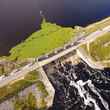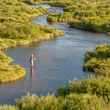Imagine this chilling news: A collision in space has changed the orbit of an asteroid the Hubble telescope has measured at about eighty kilometers in diameter. NASA astronomers analyzing the new orbital trajectory of the asteroid calculate a ninety percent probability that it will collide with Earth in about five years. The mass of the comet is about the same as the Chicxulub asteroid that hit Earth 66 million years ago and ended the Cretaceous Period with one of the five great mass extinctions in the planet’s history.
Thankfully, there was no such discovery. But if there had been, how do you think the media would handle it? An article or five-minute news segment a week? Somehow, I don’t think so. I suspect there would be non-stop coverage, twenty-four-seven. We’d hear the opinion of every scientist in the world, not only the astronomers but physicists, chemists, biologists, paleontologists, geologists, and economists. We’d be treated to the opinions of engineers, politicians, and every man and woman on the street. We’d suffer through descriptions of the history of such collisions, their effect on plants and animals, the evidence for survival and extinction, the origin of asteroids and comets, their gravitational and orbital dynamics. Plans for deflecting the projectile would be proposed, debated, and discussed endlessly in the press. The rumor mill on the Web would fire up, and Snopes would be overwhelmed, trying to separate fact from fiction. The asteroid would consume every second of our attention. And when the last possible interview had ended, the last animated video aired, the last crazy Facebook prognostication laid to rest, the networks and social media would start at the beginning and do it all again. For five years.
There’s no asteroid coming. What is coming is much closer to home, much more subtle, insidious, but every bit as dangerous. Climate change. Pretty much everything we really depend on— supplies of food and fresh water, an ambient temperature somewhere between fifty below and 140 above, a sensible amount of rain, an absence of drought, productive land, productive ocean— is shifting, and not in a good way. It’s happening. Right now.
In the summer of 2003, officials estimated that the heat wave in Europe killed nearly 15,000 people in France, and another 20,000 across the continent. More than 55,000 people died in the 2010 heat wave in Russia.
In 2017, forest fires across the country burned 9.8 million acres. A little more than $16 billion dollars in damage. The fires in California that year: another $13 billion in losses, fifty dead. The drought in the Dakotas and Montana: $2.5 billion. That hailstorm in May of 2017 that nobody outside the southern Great Plains even heard about: $2.5 billion.
In 2017, major bouts of severe weather in the United States alone cost us $306 billion in 2017 and nearly 5,000 lives. That’s a lot of adapting. And, while it can be argued that there is no incontrovertible proof that these weather events were caused or made worse by the climate change we’ve created, nearly any expert will tell you that they are exactly what he expects as the planet gets warmer.
The Bureau of Reclamation describes the drought that continues to plague much of the Colorado River basin in the western United States as “one of the driest 20-year periods in the last 1,200 years.” The drought in the Middle East that began in 1998 and continued through 2012 was the worst in the last 900 years, according to NASA scientists, and many observers believe it’s one of the root causes of ongoing violence in the region, as well as the massive wave of emigrants that have fled to Europe.
After seven years of crushing drought, torrential rains descended on the rangeland around Queensland, Australia, last week. The resulting floods have killed more than 300,000 cattle ... so far. In the U.S., something like 1.9 million acres burned in California last fall, at a cost of around $13 billion and 96 dead.
NASA recently announced that, worldwide, 2018 was the fourth hottest year on record, even with La Nina exerting its massive cooling effect in the Pacific basin. So, the last five years have been the hottest five years on the planet since record-keeping began.

And it’s likely to get worse. Carbon concentrations in the world’s atmosphere continue to rise. Last year, the U.S. increased its carbon dioxide emissions by 3.4 percent. If that’s the best we can do in the way of controlling our emissions, things are likely to get a whole lot worse.
This is the asteroid that’s headed our way. While I don’t believe that the deterioration in climate will lead to the extinction of the human species, I don’t think it’s far-fetched to see it as an existential threat to human civilization and to a large proportion of the 9 billion people we’ll soon have on the planet. Among all my other worries about the shift in climate and its effects, I wonder why our media don’t give climate more coverage.
With all deference to the spectrum of issues that face Americans and the world, I have to say that none of the rest even approaches the importance of climate change. Not war or racism, not equal rights for women or protection from sexual harassment and abuse, not terrorism, or immigration, or gun control, or the 2020 Presidential election, or the possibility of impeachment, or Russian interference in western elections. Let alone the Grammys.
Climate change is a complex issue. There are many, many research efforts churning out data on everything from ice sheets in Antarctica and glaciers in Greenland to insect populations in Costa Rica and flowers in Jackson Hole. There are reconstructions of the past, massive descriptions of emerging problems in the present, and increasingly sophisticated projections of the future. There are technical treatises and a nearly inexhaustible supply of human-interest stories. There is no shortage of material.
Yet, the media choose to treat climate change as a third-rate topic. I’ve been in the business of communication for forty years— I get the need to build audience— but I also know there is a responsibility to give the really big stories the attention they deserve, whether the public has an interest or not. If that means there’s less coverage of the Super Bowl or the Oscars or this year’s fashion trends from Paris, if it means that this morning’s Trump tweets end up next to the comics, then that’s what it means. Sure, we all need a respite from the day-to-day frustrations and disappointments of life. We could all use a break.
But there’s an asteroid coming ...






























Comments
Bob Johnson replied on Permalink
Is this Satire? Has to be right....? The idea that media is ignoring the idea of climate change is so laughable. It is literally in the news every single day from every major and minor publisher. I bet 50% of Hatch articles are about climate change....
Meow replied on Permalink
And what the hell do you want them to do about it? My God, who cares?
Anonymous replied on Permalink
Oh my gad!! Who wrote this? Hahaha you had me. My jaw dropped when I read about the trajectory changing. Then I got to the third paragraph. Bloody heck!!!
Charles S. Shapira replied on Permalink
Bravo....everyone needs to wake up and smell the coffee.
DanH replied on Permalink
Any credibility you may have had has been stripped away with this article. Congratulations on being the biggest discredit to journalism.
Gordon Hommes replied on Permalink
Ultimately, the problem is with the scientific illiteracy of the media, the refusal of an overwhelmingly anti-intellectual populace to accept basic facts, and the lack of political leaders who recognize the extreme measures that are required to really tackle this crisis. Human population growth (the driver of nearly every environmental problem) must end, forests must be restored, and a complete re-tooling of our agricultural, energy, and transportation sectors away from fossil fuels need to happen FAST.
Anonymous replied on Permalink
There is the belief that we are already 10 years too late. Why do you think there is a puah to find other habitable planets.
W replied on Permalink
I really appreciate your particular frustration with these dumb assteroid articles that keep popping up on my Google feed, some of them are years old and it seems like a pretty stupid agenda on the part of Google. Don't know that I agree about the amount of coverage on climate change, I would rather see real research getting done by our modern throne of civilization that is the US.
But I am amused to see that there is still a plausible segment of the internet public (real or not) who think there is any basis for denial. The economy tanked decades ago and people here still think we are doing GREAT, but standing in ankle-deep water in their living room for the third year straight is just another bad storm season.
I don't know, I think we're past the whole "Wake Up" talk... I think we'll just move straight to the shackles next.
Steelhead Ranger replied on Permalink
Revised previous comment I'd prefer published if you decide to allow it:
The inaction on adapting or militating against to inevitable climate change is a prime example of the stalemate that occurs when opposing sides take extremist positions. While it is likely man's activities are accelerating the change though we don't know how much, climate cycles are natural, pre-date man, and warming is inevitable. Nature just published a new paper showing that 3 million years ago the ocean was 52 feet higher than current levels and that occurred before man burned fossil fuels because he wasn't here.
Instead of taking the moderate position that while man's activities are likely accelerating it, climate change is natural, inevitable, and, that mankind's focus should be on slowing his contribution to it and preparing to adapt to it in practical and measured way to avoid economica crises, we are at loggerheads because each side demonizes and ridicules the other and refuses to compromise.
For example we have one side proposing extreme draconian bans that are unworkable without plunging mankind into the dark ages economically, will force developing nation near complete de-forestation for energy needs, and kill more people through starvation and disease than much slower climate change would. At the same time, the other side completely denies the climate is changing significantly, refuses to acknowledge man's role, and make significant attempts to curtail man's pollution.
Worst of all, regarding the moderate position of adaptation and weaning off fossil fuels and their pollution while ameliorating economic crises, neither side proposes any plans to consider that reasonable and workable compromise. Compromise is off the table. So we are mired in stalemate caused indefensible extremist positions and so, at odds, do next to nothing while demonizing and ridiculing each other's positions. Just like we do with every other crisis like immigration, China's bad trade and intellectual property behavior, etc., etc.
Roger Lahti replied on Permalink
I don’t know of anyone who actually thinks that can or will deny that climate is changing,warming. The real issue is what can reasonably done about it that we aren’t doing already as fast as technology will allow. But is the level of panic demonstrated by some of the schemes put out there really practical? I’ve heard nothing purported by the political class that wouldn’t quickly destroy the worlds economy and set us back two or three hundred years. And that would be the equivalent of a self made asteroid hit. A small example is represented in the movement to breach Snake River Dams. There is no understanding of the simple fact that what they provide would destroy a vital segment of a Western State. Just on the hope that more salmon and steelhead would make it past the sea lions, Caspian Terns, pelicans and unfavorable ocean conditions and have an uninterrupted path up the lower section of the River just to run into upper river dams with no fish passage facilities. It would cause, the breaching, a strain on commodity transportation, the removal of a stable source of non polluting electrical generation, the removal of many acres of productive farm land, and perhaps flood control as the weather patterns shift. Wind solar and other similar so called clean energy still require petroleum and steel along with mining of rare metals to build and store the little intermittent power they produce. I could go on. And on.
Pages